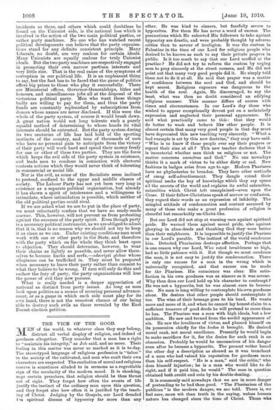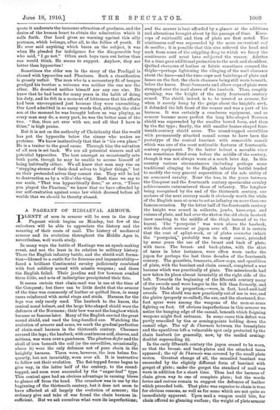THE VICE OF THE GOOD.
AIEN of the world, to whatever class they may belong, distrust all verbal display of religion, and indeed of goodness altogether. They consider that a man has a right to " maintain his integrity," as Job said, and no more. Their feeling in this matter was never so marked as it is to-day. The stereotyped language of religions profession is "taboo" in the society of the cultivated, and men who exalt their own characters are suspected The exaltation of moral and religious reserve is sometimes alluded to in sermons as a regrettable sign of the secularity of the modern mood. It is shocking, urge certain preachers, that religion should be thus thrust out of sight. They forget how often the events of life justify the instinct of the ordinary man upon this question, and they forget also how often it is justified by the teach- ing of Christ. Judging by the Gospels, our Lord dreaded -Ike spiritual disease of hypocrisy far more than any other. He was kind to sinners, but fearfully severe to hypocrites. For them He has never a. word of ' excuse. The precautions which He exhorted His followers to take against hypocrisy are drastic, and were probably thought by adverse critics then to savour of irreligion. It was the custom in Palestine in the time of our Lord for religious people who desired to be known as such to say their private prayers in public. Is it too much to say that our Lord scoffed at the practice ? He did not try to reform the custom by urging men to pray sincerely at the street corners, and He did not point out that many very good people did it. He simply told them not to do it at all. He said that prayer was a matter of confidence between the soul and God, and should be kept secret. Religious exposure was dangerous to the health of the soul. Again, He discouraged, to say the least, what was then no doubt considered an edifying religious manner. This manner differs of course with times and circumstances. In our Lord's day those who wished to appear exceptionally devout put on a melancholy expression and neglected their personal appearance. He said what practically came to this : that they would do better to wash and behave like other people. It is almost certain that many very good people in that day must have deprecated this new teaching very sincerely. "What a, bad example is set by this new doctrine," they may have said. " Who is to know if these people ever say their prayers or repent their sins at all ? This new teacher declares that it is immaterial whether men think us religious or not. The matter concerns ourselves and God." No one nowadays thinks it a mark of virtue to be either dirty or sad. New fashions in badges arise from age to age. Modern Pharisees have no phylacteries to broaden. They have other methods of smug self-advertisement. They dangle round their spiritual necks the key of knowledge which they say opens all the secrets of the world and explains its awful calamities, calamities which Christ left unexplained—even upon the Cross. If their fellow-Christians speak of sorrow or confusion, they regard their words as an expression of infidelity. ' The mingled attitude of condemnation and content assumed by many of those who make a great profession of religion is cheerful but remarkably un-Christ-like.
But our Lord did not stop at warning men against spiritual pride. He warned them against moral pride, also against glorying in alms-deeds and thanking God they- were better than their neighbours. It is impossible to justify the Pharisee in our Lord's parable. The instinct of the world condemns him. Detected Pharisaism destroys affection. Perhaps that is one reason why our Lord, Who rated lovableness so high, had so little patience with it. But though we must condemn the man, it is not easy to justify the condemnation. There is only one excuse for a man in the wrong which is universally recognised, and that excuse can be made for the Pharisee. His conscience was clear. His satis- faction in his own goodness was as sincere as it was serene. Why then does our Lord hold up his character to contempt ? He was not a hypocrite, but he was almost sure to become one. No man is long willing to contemplate his own goodness alone. He desires that other people should contemplate it too. The wine of their homage goes to his head. He wants more and more of it, and when he cannot lay honest claim to a sufficient treasure of good deeds be will pretend to more than he has. The Pharisee was a man with high ideals, but a low ambition. He saw and turned from the sordid appearance of sin. He saw the loveliness of virtue, and plumed himself on its possession chiefly for the kudos it brought. He desired moral rank, not moral excellence. Presently he would begin to make sacrifices for it, for the desire for such rank is an obsession. Probably he would be unconscious .of his danger even after he became a hypocrite. The present writer heard the other day a description as shrewd as it was trenchant of a man who had valued his reputation for goodneas more than his self-respect. " He is a man," said the critic," whO does himself injustice; he is a man who would like to do right, and if it paid him, he would." The man in question obtained both credit and coin by his double-dealing., It is commonly said nowadays that we are in more danger of pretending to be bad than good. "The Pharisaism of the publican" is the modern danger, we are told. There is, wa feel sure, more wit than truth in the saying, unless human nature has changed since the time of Christ. Those quote it underrate the immense attraction of goodness, and the desire of the human heart to obtain the admiration which it calls forth. Our Lord gives no warning against this silly pretence, which belongs, after all, to the follies of youth. If He ever said anything which bears on the subject, it was when He pleaded for indulgence for the disagreeable boy who said, "I go not." Often such boys turn out better than one would think, He seems to suggest. Anyhow, they are better than hypocrites ! Sometimes the elder son in the story of the Prodigal is classed with hypocrites and Pharisees. Such a classification is grossly unfair. The man who in a momentary fit of temper grudged his brother a welcome was neither the one nor the other. He deceived neither himself nor any one else. He knew that he had been for many years in the habit of doing his duty, and he felt in a moment of bitterness that his efforts had been unrecognised just because they were unremitting. Our Lord admitted in so many words that, although the elder son at the moment he was brought before us was playing, as every man may do, a sorry part, he was the better man of the two. " Son, thou art ever with me, and all that I have is thine," is high praise. But it is not on the authority of Christianity that the world has put the hypocrite below the sinner who makes no pretence. We know instinctively that that is "his own place." He is a traitor to the good cause. Through him the salvation of all men is set back. We are all potential sinners and all potential hypocrites. The best amongst us occasionally acts both parts, though he may be unable to accuse himself of being habitually either. We all know that men may rise on " stepping-stones of their dead selves to higher things," but on their pretended selves they cannot rise. They will be led to destruction as by a will-o'-the-wisp. Each time we say to our souls, "That was hypocritically done," or even, "There you played the Pharisee," we know that we have offended by our self-exaltation against some law which decreed before all worlds that we should be thereby abased.











































 Previous page
Previous page